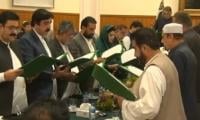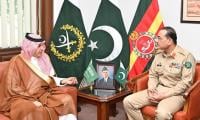ISLAMABAD: As India Thursday celebrated the arrival of a new fleet of Rafale jets, Pakistan sent out a word of caution and warned that this latest acquisition would once again lead to an arms race in South Asia, especially when advanced systems had an open intention of conversion into nuclear delivery platforms.
“The transfer of advanced systems, where there is an open intention of conversion into nuclear delivery platforms, calls into question the commitment of international suppliers to non-proliferation commitments,” said the Foreign Office Spokesperson at the weekly press briefing.
France is aiding and abetting through a policy of exemptions, waivers and supply of advanced equipment, technology and weapons for narrow commercial interests, said the spokesperson. The first batch of five French-made Rafale fighter jets arrived at an Indian Air Force (IAF) base in Ambala on Wednesday, following which Defence Minister Rajnath Singh tweeted, “If anyone should be worried about or critical about this new capability … it should be those who want to threaten our territorial integrity.”
“It is disturbing to note that India continues to amass military capabilities beyond its genuine security requirement. According to credible and reputable international research institutes, India is now the second largest arms importer in the world”, responded the spokesperson.
When questioned whether Pakistan had taken up the issue of providing these new aircraft with France, she responded, “Our bilateral relations with countries in Europe are long-standing and multi-dimensional. Defense cooperation is part of the overall matrix of our bilateral relations with these countries. So within that ambit, we do have conversations on this subject but what you are referring to is not directly related.”
The spokesperson pointed out that such arms transfers also violate the objectives of various export control regimes on preventing destabilizing accumulations of arms in various regions including where there exist outstanding conflicts and disputes.
“Transfer of advanced systems, where there is an open intention of conversion into nuclear delivery platforms, calls into question the commitment of international suppliers to non-proliferation commitments”, she added.
Pakistan says it is well known that India continues to expand and modernize its nuclear arsenal both in terms of type and number of delivery systems. In addition to this, India has nuclearized the Indian Ocean and continues to increase the readiness of its arsenal through measures such as canisterization of missile systems.
“Pakistan has been consistently highlighting the risks of massive Indian arms buildup as well as their offensive security doctrine and force postures, which are adversely affecting strategic stability in South Asia.
This arms buildup is being aided and abetted through a policy of exemptions, waivers and supply of advanced equipment, technology and weapons for narrow commercial interests”, she said.
Pakistan reached out to the world community and asked it to dissuade India from its disproportionate arms buildup, which could also lead to an arms race in South Asia. “The world is already a witness to the bellicose and irresponsible rhetoric by the BJP government in pursuit of a revisionist agenda in the neighbourhood”, was a reminder from the spokesperson.
Pakistan says it remains open to consideration of measures for crisis management, risk reduction, and strategic restraint. While remaining opposed to any arms race in South Asia, Pakistan cannot remain oblivious to these developments and remains confident of its ability to thwart any ill-considered act of aggression.
To a query on the inauguration of Babri Masjid site, the spokesperson replied, “We have seen the reports about inauguration on 5th August. This step will further give rise to extremism and fascism spurred by the BJP–RSS nexus in pursuit of its Hindutva ideology, which is not only a growing threat to the safety and well-being of minorities in India, but also to the peace and security in the region and beyond”.
Saad was of the view that the battle of politics should be fought solely through political means
KP govt decided to develop gemstone business as a formal export sector and cluster at the Namak Mandi would be...
Khyber Pakhtunkhwa Minister for Higher Education, Archives, and Libraries, Meena Khan Afridi. — APP FilePESHAWAR:...
Vehicles and horse carts passing through flood water at Bara Bazar area on Khuwani bridge after heavy rain in Peshawar...
Amid the failure to revive the cash-bleeding PIA, government is left with no other option but to sell it to any...
Picture showing the Silver Jubilee Gate of the University of Karachi. — APP File KARACHI: The University of Karachi...







